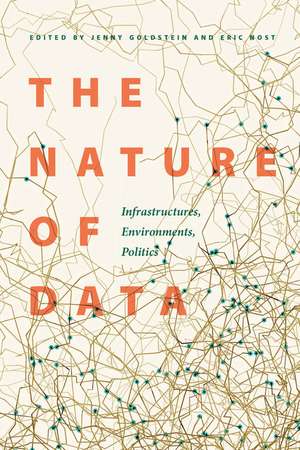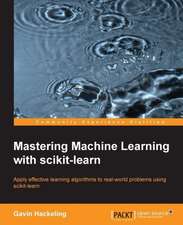The Nature of Data: Infrastructures, Environments, Politics
Editat de Jenny Goldstein, Eric Nosten Limba Engleză Hardback – 30 sep 2022
By bringing together scholars from geography, anthropology, science and technology studies, and ecology, The Nature of Data explores how the digital realm is a significant site in which environmental politics are waged. This collection as a whole makes the argument that we cannot fully understand the current conjuncture in critical, global environmental politics without understanding the role of data platforms, devices, standards, and institutions. In particular, The Nature of Data addresses the contested practices of making and maintaining data infrastructure, the imaginaries produced by data infrastructures, the relations between state and civil society that data infrastructure reworks, and the conditions under which technology can further socio-ecological justice instead of re-entrenching state and capitalist power. This innovative volume presents some of the first research in this new but rapidly growing subfield that addresses the role of data infrastructures in critical environmental politics.
| Toate formatele și edițiile | Preț | Express |
|---|---|---|
| Paperback (1) | 171.64 lei 3-5 săpt. | +18.79 lei 6-12 zile |
| Nebraska – 30 sep 2022 | 171.64 lei 3-5 săpt. | +18.79 lei 6-12 zile |
| Hardback (1) | 654.93 lei 6-8 săpt. | |
| Nebraska – 30 sep 2022 | 654.93 lei 6-8 săpt. |
Preț: 654.93 lei
Preț vechi: 818.65 lei
-20% Nou
Puncte Express: 982
Preț estimativ în valută:
125.32€ • 130.84$ • 103.72£
125.32€ • 130.84$ • 103.72£
Carte tipărită la comandă
Livrare economică 04-18 aprilie
Preluare comenzi: 021 569.72.76
Specificații
ISBN-13: 9781496217158
ISBN-10: 1496217152
Pagini: 344
Ilustrații: 11 photographs, 11 illustrations, 3 maps, 3 tables, 4 charts, index
Dimensiuni: 152 x 229 x 29 mm
Greutate: 0.68 kg
Editura: Nebraska
Colecția University of Nebraska Press
Locul publicării:United States
ISBN-10: 1496217152
Pagini: 344
Ilustrații: 11 photographs, 11 illustrations, 3 maps, 3 tables, 4 charts, index
Dimensiuni: 152 x 229 x 29 mm
Greutate: 0.68 kg
Editura: Nebraska
Colecția University of Nebraska Press
Locul publicării:United States
Notă biografică
Jenny Goldstein is an assistant professor of global development at Cornell University. Eric Nost is an assistant professor of geography, environment, and geomatics at the University of Guelph.
Cuprins
List of Illustrations
List of Tables
Introduction: Infrastructuring Environmental Data
Jenny Goldstein and Eric Nost
Part 1. Sensors, Servers, and Structures
1. Data’s Metropolis: The Physical Footprints of Data Circulation and Modern Finance
Graham Pickren
2. An Emerging Satellite Ecosystem and the Changing Political Economy of Remote Sensing
Luis F. Alvarez León
3. Smart Earth: Environmental Governance in a Wired World
Karen Bakker and Max Ritts
4. Data, Colonialism, and the Transformation of Nature in the Pacific Northwest
Anthony Levenda and Zbigniew Grabowski
Part 2. Civic Science and Community-Driven Data
5. Environmental Sensing Infrastructures and Just Good Enough Data
Jennifer Gabrys and Helen Pritchard
6. Collaborative Modeling as Sociotechnical Data Infrastructure in Rural Zimbabwe
M. V. Eitzel, Jon Solera, K. B. Wilson, Abraham Mawere Ndlovu, Emmanuel Mhike Hove, Daniel Ndlovu, Abraham Changarara, Alice Ndlovu, Kleber Neves, Adnomore Chirindira, Oluwasola E. Omoju, Aaron C. Fisher, and André Veski
7. Citizen Scientists and Conservation in the Anthropocene: From Monitoring to Making Coral
Irus Braverman
8. Data Infrastructures, Indigenous Knowledge, and Environmental Observing in the Arctic
Noor Johnson, Colleen Strawhacker, and Peter Pulsifer
9. Digital Infrastructure and the Affective Nature of Value in Belize
Patrick Gallagher
10. Infrastructuring Environmental Data Justice
Dawn Walker, Eric Nost, Aaron Lemelin, Rebecca Lave, Lindsey Dillon, and Environmental Data and Governance Initiative (EDGI)
Part 3. Governing Data, Infrastructuring Land and Resources
11. “A Poverty of Data”? Exporting the Digital Revolution to Farmers in the Global South
Madeleine Fairbairn and Zenia Kish
12. Illicit Digital Environments: Monitoring and Surveilling Environmental Crime in Southeast Asia
Hilary O. Faxon and Jenny Goldstein
13. Data Gaps: Penguin Science and Petrostate Formation in the Falkland Islands (Malvinas)
James J. A. Blair
14. Data Structures, Indigenous Ontologies, and Hydropower in the U.S. Northwest
Corrine Armistead
15. How Forest Became Data: The Remaking of Ground-Truth in Indonesia
Cindy Lin
Conclusion: Toward a Political Ecology of Data
Rebecca Lave, Eric Nost, and Jenny Goldstein
Source Acknowledgments
Contributors
Index
List of Tables
Introduction: Infrastructuring Environmental Data
Jenny Goldstein and Eric Nost
Part 1. Sensors, Servers, and Structures
1. Data’s Metropolis: The Physical Footprints of Data Circulation and Modern Finance
Graham Pickren
2. An Emerging Satellite Ecosystem and the Changing Political Economy of Remote Sensing
Luis F. Alvarez León
3. Smart Earth: Environmental Governance in a Wired World
Karen Bakker and Max Ritts
4. Data, Colonialism, and the Transformation of Nature in the Pacific Northwest
Anthony Levenda and Zbigniew Grabowski
Part 2. Civic Science and Community-Driven Data
5. Environmental Sensing Infrastructures and Just Good Enough Data
Jennifer Gabrys and Helen Pritchard
6. Collaborative Modeling as Sociotechnical Data Infrastructure in Rural Zimbabwe
M. V. Eitzel, Jon Solera, K. B. Wilson, Abraham Mawere Ndlovu, Emmanuel Mhike Hove, Daniel Ndlovu, Abraham Changarara, Alice Ndlovu, Kleber Neves, Adnomore Chirindira, Oluwasola E. Omoju, Aaron C. Fisher, and André Veski
7. Citizen Scientists and Conservation in the Anthropocene: From Monitoring to Making Coral
Irus Braverman
8. Data Infrastructures, Indigenous Knowledge, and Environmental Observing in the Arctic
Noor Johnson, Colleen Strawhacker, and Peter Pulsifer
9. Digital Infrastructure and the Affective Nature of Value in Belize
Patrick Gallagher
10. Infrastructuring Environmental Data Justice
Dawn Walker, Eric Nost, Aaron Lemelin, Rebecca Lave, Lindsey Dillon, and Environmental Data and Governance Initiative (EDGI)
Part 3. Governing Data, Infrastructuring Land and Resources
11. “A Poverty of Data”? Exporting the Digital Revolution to Farmers in the Global South
Madeleine Fairbairn and Zenia Kish
12. Illicit Digital Environments: Monitoring and Surveilling Environmental Crime in Southeast Asia
Hilary O. Faxon and Jenny Goldstein
13. Data Gaps: Penguin Science and Petrostate Formation in the Falkland Islands (Malvinas)
James J. A. Blair
14. Data Structures, Indigenous Ontologies, and Hydropower in the U.S. Northwest
Corrine Armistead
15. How Forest Became Data: The Remaking of Ground-Truth in Indonesia
Cindy Lin
Conclusion: Toward a Political Ecology of Data
Rebecca Lave, Eric Nost, and Jenny Goldstein
Source Acknowledgments
Contributors
Index
Recenzii
"This book is a necessary piece to lay the groundwork for a political ecology of data and urge more research in this direction. . . . A welcome integration of digital social sciences, political ecology, critical GIS, and science and technology studies, and as such which will be of interest to scholars across these fields, but also to conservation practitioners. This collection of essays might also be useful as a methodological text for advanced graduate students."—Anne-Lise Boyer, H-Environment
"Thanks to insights from ecomedia studies, environmental humanists are increasingly studying how the environment becomes digital and the digital becomes environmental. The Nature of Data ably contributes to this research."—Heather Houser, ISLE
“Data may not grow on trees, but it increasingly shapes how humans know, govern, and struggle over forests—and indeed, much of the nonhuman world. The Nature of Data captures this moment empirically while advancing political ecology conceptually. An altogether stellar volume.”—Susanne Freidberg, author of Fresh: A Perishable History
“In accelerating ways, environmental politics are data politics. This powerful book shows what this looks like in different settings and at different scales, persuasively calling for a new subfield focused on the political ecology of data. Extending from prior work on the delimitations and politics of environmental science, the collection draws out what environmental data can help us see, what it cuts out, and how environmental data production itself is both polluting and weighted by commercial interests.”—Kim Fortun, author of Advocacy after Bhopal: Environmentalism, Disaster, New Global Orders
“This is an original, diverse, and scintillating collection. Researchers working on political ecology of conservation and conservation social science have not taken challenges of data justice or the political economy of data production seriously enough. We must—and this book shows us how and why.”—Dan Brockington, author of Celebrity Advocacy and International Development
“As environments are reverse engineered to match the spreadsheets and management platforms in which they are tallied, the environmental politics of data control, organization, and proliferation will hugely influence ecologies and politics going forward. By putting that insight front and center, Goldstein and Nost assemble a sweeping set of essays that gaze into the sometimes-disturbing future of the planet.”—Paul Robbins, author of Political Ecology: A Critical Introduction
“This volume contributes to the growing discourses around political ecological work on data and the infrastructures that sustain, produce, and exchange them. The volume is startling in both its depth and breadth of engagement with timely and important topics; it marks a significant contribution to a growing field.”—Jim Thatcher, author of Thinking Big Data in Geography: New Regimes, New Research
“Throughout, the reader is plunged into the complexities of digital systems, the environments they monitor and conserve, and the limits to their governance and oversight across a variety of places and scales and sovereignties. What emerges is resolutely not an endorsement of further digitalization of nature but a recognition that digitalization is perhaps yet another set of processes in which nature is actively produced.”—Matthew W. Wilson, author of New Lines: Critical GIS and the Trouble of the Map
Descriere
By synthesizing scholarly work at the intersection of political ecology, digital geography, and science and technology studies, The Nature of Data analyzes how new digital technologies affect environments and their control.











